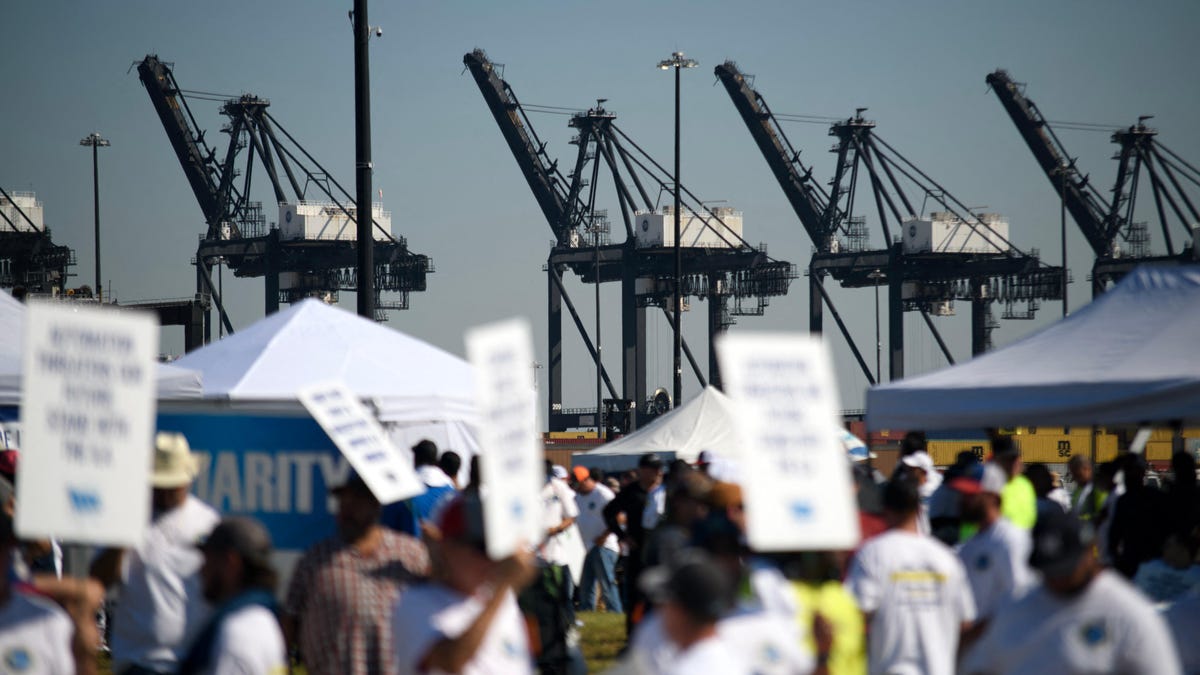Port workers on the East and Gulf Coast officially went on strike early on October 1 after the union and a port operators alliance couldn’t come to an agreement on pay increases and automation. Now, container traffic is halted from Maine to Texas. This – as you may have imagined – could spell disaster for the automotive supply chain.
The ports covered by these striking dockworkers handled about $37.8 billion worth of vehicle imports in the 12 months that proceeded June 30, 2024, Automotive News reports. That number doesn’t even tell the full picture, as it doesn’t include the shipment of vehicle parts and other car-related items. A shortage in that area could spell disaster for the automotive industry if the strike persists. Some experts believe that if the strike goes on long enough (read: CEOs don’t give workers what they deserve), plants and production lines may be paused and layoffs might happen.
Here’s how this all came to a head after months of negotiations, according to Automotive News:
The labor contract between the International Longshoremen’s Association union representing 45,000 port workers and the United States Maritime Alliance employer group expired late on Monday, with negotiations at an impasse over pay.
The USMX said in a statement on Monday it had offered to hike wages by nearly 50 percent and traded new proposals with the union in the last 24 hours and asked for an extension of the current master contract.
“We are hopeful that this could allow us to fully resume collective bargaining around the other outstanding issues – in an effort to reach an agreement,” USMX said.
This strike could apparently cost the U.S. economy up to $5 billion per day, JP Morgan analysts told AutoNews. The automotive industry represents a pretty sizable chunk of that, with millions of cars coming in and out of U.S. ports each year. The Port of Baltimore alone handled 847,158 vehicles in 2023.
Here’s how the automotive world could be impacted and what automakers are doing to get by while this is all going on:
Retailers and auto companies in recent months have accelerated holiday imports and are moving other shipments to the U.S. West Coast where possible.
[…]
The strike will have wide-reaching impacts on the auto industry, said Jack Hollis, head of sales for Toyota Motor North America.
“I don’t care if it’s one day, two days — every single day of these things can cause issues for people to consider,” he said. “And yeah, this will affect everybody; it just does.”
Barclays researchers said they expect European automakers such as BMW, Mercedes, Volkswagen and Volvo to be among the car companies whose imports would be affected, but noted that relatively high inventories will shield the immediate impact.
Hyundai Motor America is in “close contact” with its logistics affiliate, Hyundai Globis, CEO Randy Parker said. The automaker utilizes ports in Philadelphia and Brunswick, Ga.
The automaker is “working up on contingencies to ensure that we have steady processing and delivery of Hyundai vehicles,” he said. “They’ve been good over the years at managing disruptions, and so we’re going to do our best to try to manage this disruption as well.”
It isn’t just foreign car companies either. This is also impacting the Big Three automakers. However, they do not seem quite as worried:
General Motors is “carefully monitoring the situation and [has] contingency plans in place,” a spokesperson said, adding that the company will work to mitigate any impacts to its operations.
Ford is monitoring the situation, a spokesperson said, adding that it was too early to speculate on potential impacts.
There has been no impact to Stellantis’ operations thus far, it said in a statement.
“The company is taking the necessary actions to mitigate any potential impact to production or our ability to deliver vehicles to our customers,” the automaker said.
It isn’t just the cars, though. Parts are also a huge issue now. An analyst for Barclays told AutoNews that 70 percent of auto parts imported in the U.S. come from ports that are currently experiencing strikes. However, it’s likely that some inventory was built up in anticipation of this strike.

